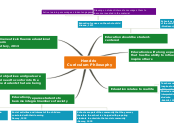Hendrix
Curriculum Philosophy
Education should be student-centered
Education focuses on the whole child
-Greene, 1971
Active learning encourages student engagement
Drawing on student interest encourages them to become invested in the material
Schools must "permit the free, natural manifestations of the child" in order for sure learning to occur
-Montissori, 1912
Education is a life long experience that has the ability to influence and inspire others
The spirit of education should show through teachers and that enthusiasm will inspire learning.
-Montessori, 1912
Learning moves beyond the classroom. This outside experience emphasizes the continuous nature of education.
-Barker, 2002
Education relates to real life
Teachers use their own experiences to prepare and inspire students
-Ball and Cohen, 1999
Directed and undirected instruction encourage interpretation and application of concepts by students.
-Bobbitt, 1918
Hermeneutics influence educational reform
-Slattery, 2013
Changes in the law, social norms and acceptance, politician focus, etc.continually influence curriculum
History and interpretation of historical events create the backdrop for the election of curriculum course content
Educational objectives and goals are flexible and need to conform to the needs of the students that are being addressed
"Objectives need not precede the selection and organization of content."
-Eisner, 1967
Educational objectives should be clearly identifies and measurable in order to provide adequate feedback concerning their effectiveness.
-Popham, 1972
Education prepares students to become integral members of society
School is a social institution where students learn about life
-Dewey, 1929
Social activities and interest of the child are correlated with their learning
Dewey, 1929
Schools are part of the community that they server, therefore the school is charged with preparing students to enter into that social community
-Dewey, 1929
